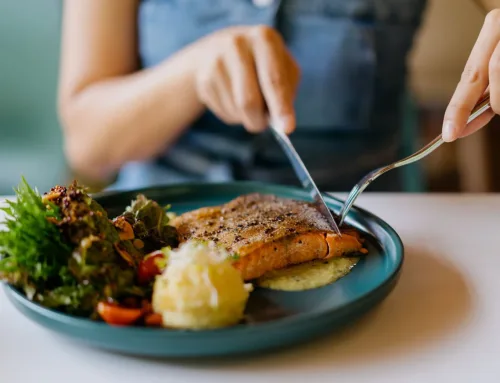I often catch myself mindlessly snacking when I’m bored, even though I know I’m not really hungry. It’s a common habit, and I’m not the only one guilty of it.
Boredom eating can easily lead to packing on those extra pounds and falling into unhealthy eating routines. So, I’ve been diving into ways to kick this habit to the curb – there are 15 of them! From figuring out what triggers my boredom eating to finding other things to do and mastering the art of telling apart hunger from boredom, these tips are helping me build a better connection with food.

1. Identify Triggers for Boredom Eating
The key to kicking boredom eating to the curb is figuring out what exactly triggers those urge-to-snack moments when you’re not even hungry. It could be stuff like emotional eating or mistaking what your body’s trying to tell you.
Understanding these triggers is huge because it gives you insight into why you reach for the snacks when stress or emotions are running high. Emotional eating, for example, might be your way of seeking comfort or distracting yourself from those not-so-great feelings. Unpacking these emotions can set you on the path to healthier coping strategies.
And then there’s the classic mix-up of thinking you’re hungry when you’re really just thirsty. It happens to the best of us! By paying attention to your body’s signals and learning to separate real hunger from other cues, you can totally shift your eating habits for the better.
Further reading: 7 Effective Tips on How to Stop Feeling Hungry All the Time
2. Find Alternative Activities
When I start to feel bored, I try to steer clear of mindlessly eating and instead, I look for activities that can keep my mind and body busy. I might go for a run, do some yoga, or spend some time on self-care.
If I catch myself reaching for snacks out of sheer boredom, I switch gears and dive into a new hobby like painting, gardening, or crafting. These activities not only take my mind off food but also give me a sense of achievement and unleash my creativity.
I find that socializing with friends or joining a club can be a great way to have some fun, lift my spirits, and improve my overall well-being. By incorporating these engaging activities into my daily routine, I’m able to build a healthier relationship with food and boost both my mental and physical health.
3. Keep Healthy Snacks Available
I always make sure to keep healthy snacks within arm’s reach to help me make better food choices when I get the munchies. These snacks not only curb my hunger but also give my body the essential nutrients it needs.
I usually go for options like mixed nuts, Greek yogurt with berries, hummus with veggie sticks, or a piece of fruit. The nuts are great for healthy fats and protein to keep me full longer. Greek yogurt is a powerhouse of probiotics and calcium for digestion and bone health. Hummus is a champ for fiber and plant-based protein. And fruits are bursting with vitamins, minerals, and antioxidants.
Having these snacks on hand really helps me from overeating and keeps my diet in balance.
4. Practice Mindful Eating
Regarding eating, I’m all about that mindful approach. I pay close attention to my eating habits, really tuning in to my hunger and fullness cues, and making sure to listen to what my body is telling me.
Practicing mindful eating has really helped me form a deeper bond with the food I eat. I focus on the taste, texture, and smell of each bite, which makes every meal a whole experience.
I’ve learned that taking my time with each mouthful not only makes the meal more enjoyable, but it also helps me understand what my body needs. By ditching distractions like TV or scrolling through my phone while I eat, I can better tell if I’m truly hungry or just looking to eat out of boredom or emotions.
5. Plan Meals and Snacks Ahead of Time
I find that planning my meals and snacks ahead of time really helps me control my portions and stick to my diet plan more effectively.
When I create a structured meal plan, I’m not just ensuring I eat a balanced diet; I’m also cutting down on those impromptu eating sessions. Having a well-thought-out meal plan lets me include a mix of fruits, veggies, whole grains, lean proteins, and healthy fats, making sure my body gets all the nutrients it needs.
To keep things interesting, I like to mix it up with different recipes and cuisines during the week. I’ve also found that portioning out my meals and snacks in advance makes it easier to grab something healthy when hunger strikes, instead of going for something less nutritious.
6. Keep a Food Journal
I find that keeping a food journal is a really eye-opening way to learn more about my eating habits and become more aware of what I put into my body.
When I’m jotting down in my food journal, it’s not just about listing what I eat – I also note down when and where I eat, how big my portions are, how I’m feeling emotionally, and any triggers that might have influenced my food choices. I even make sure to write down any physical symptoms or emotions I experience after eating. This level of detail really helps me see patterns, like if I tend to eat when stressed or out of boredom. By regularly checking in on my food journal, I can pick up on trends, improve my understanding of my relationship with food, and pinpoint areas where I can make positive changes for my overall health.
7. Set Realistic Goals
I find that setting realistic and achievable goals is key to keeping me motivated and helping me make positive lifestyle changes. When I set SMART goals (Specific, Measurable, Achievable, Relevant, Time-bound), I give myself a clear roadmap to follow. These criteria really help me define my objectives clearly and track my progress effectively.
Breaking down my big dreams into smaller, bite-sized tasks is my secret sauce. It creates a bunch of achievable milestones that I can celebrate along the way. Each little win gets me closer to my ultimate goal and keeps me moving forward. This method not only gives me a sense of accomplishment but also helps me build positive habits that stick around, leading to long-lasting success.
8. Seek Support from Friends and Family
I find that having the support of my friends and family can really boost my self-discipline and have a positive impact on my mental well-being, making it easier to stick to healthier eating habits.
It’s amazing how having my loved ones rooting for me can keep me motivated. Their encouragement is like a shot of inspiration, reminding me of my goals and pushing me to keep moving forward.
For instance, a simple text message cheering me on or a hug of congratulations after a good workout can really lift my mood and reinforce my dedication. When someone holds me accountable, it helps me stay on track and monitor my progress, leading to more consistency and long-term success.
Further reading: How to Manage Nausea When Hungry: Symptoms and Solutions
9. Distract Yourself with a Hobby
I find that getting into a hobby is a great way to keep my mind off unnecessary snacking and improve my self-control. It serves as a distraction and a mindful practice that really helps me.
Not only do these hobbies distract me from impulsive behaviors, but they also give me a sense of accomplishment and satisfaction. Whether I’m gardening, painting, or playing a musical instrument, these activities require focus and discipline that can really help with self-regulation in other aspects of my life.
Engaging in hobbies that I genuinely enjoy is a fantastic way to reduce my stress and anxiety levels. It brings a sense of calmness and well-being that are crucial for maintaining my self-control.
10. Practice Stress Management Techniques
I like to incorporate stress management techniques into my daily routine as a key wellness strategy to curb those boredom-induced munchies.
When I’m feeling overwhelmed or anxious, I make sure to take a few minutes for meditation to help calm my mind and bring down those stress levels. Deep breathing exercises, like diaphragmatic breathing, can work wonders in instantly lowering those pesky stress hormones running wild in my body.
Plus, getting my yoga on regularly not only helps me get more flexible and strong but also gives me a sense of peace and relaxation.
By utilizing these stress-busting techniques, I’ve noticed that I’m less tempted to grab unhealthy snacks as a way to deal with emotional or mental strain.
11. Avoid Boredom Triggers
I always try to identify and steer clear of those common boredom triggers to keep my self-control in check and avoid unnecessary snacking.
When boredom hits, I’ve got a few tricks up my sleeve to keep myself from reaching for the snacks. I’ve created a list of go-to distractions like diving into a good book, taking a stroll, or diving into a new hobby to keep me busy. Mixing things up and changing my environment is key to stopping those mindless snack attacks. Whether it’s rearranging my workspace or stepping outside for a quick breather, a change of scenery always helps me reset my mindset.
12. Find a Healthy Outlet for Emotions
I always make sure to find healthy ways to deal with my emotions because it can help me avoid emotional eating and boost my mental well-being. I love journaling because it gives me a safe space to pour out my thoughts and feelings, helping me make sense of them and work through any emotions I’m dealing with.
Chatting with a friend or someone I trust is another go-to for me. It’s great to have that support and get a fresh perspective, especially when things get tough. And when I’m feeling creative, I dive into painting, dancing, or playing music. It’s my way of expressing myself and feeling accomplished, which always lifts my spirits and eases any stress I might be feeling.
13. Don’t Keep Trigger Foods in the House
I always make sure to banish those tempting trigger foods from my kitchen to help me control my cravings and keep my portion sizes in check. It’s all about stepping up my nutrition game.
Regarding identifying those sneaky trigger foods, I pay close attention to how they make me feel after I eat them. Whether it’s bloating, fatigue, or even mood swings, those signals tell me what needs to go. I swap out those troublemakers with healthier alternatives like fresh fruits, veggies, whole grains, and lean proteins – the good stuff.
To keep things exciting, I like to get creative in the kitchen with new recipes and flavors that make healthy eating fun and sustainable. And I always remember to practice mindful eating, tuning into my body’s cues for hunger and fullness to keep my diet balanced and nutritious. It’s all about finding that delicious balance!
14. Seek Professional Help If Needed
If you’re struggling to kick that boredom eating habit solo, getting some professional help could be a game-changer for your self-care and mental well-being.
Dietitians are like food wizards who whip up personalized nutrition plans to help you understand your eating habits and build healthier choices. Therapists are like emotional detectives, digging deep into the reasons behind your boredom eating and giving you tools to deal with them. Support groups are like your cheer squad, creating a tight-knit community that keeps you accountable.
With these experts on your side, you can pick up new coping strategies and tactics to handle tough situations, paving the way for a healthier relationship with food and an all-around better sense of well-being.
15. Celebrate Small Victories
I find that celebrating the small wins along my journey really amps up my motivation and strengthens my self-discipline, making it easier for me to crush my goals.
I believe that recognizing and cheering for every tiny step of progress is key to keeping a positive attitude and staying persistent. To keep track of my progress, I like to set milestones and treat myself to non-food rewards when I hit them. Whether it’s treating myself to a new book, pampering myself with a spa day, or simply taking a day off to do something I love, these rewards help me acknowledge my achievements. Not only do I feel a sense of accomplishment, but I also build up momentum to keep pushing forward towards my big goal.
Why Do We Eat When We’re Bored?

I’ve been thinking about why I tend to snack when I’m bored. It’s important to understand this common eating behavior, which often comes from emotional eating or trying to fill a void.
When I can pinpoint the emotional triggers that push me to snack out of boredom, I can start to unpack why I do it. Maybe it’s a way to handle stress, combat loneliness, or just find some pleasure or comfort.
I realize that certain habits or routines have trained me to reach for food when I’m bored. Once I figure out what triggers me, I can work on developing healthier ways to cope and meet my emotional needs without turning to food for comfort.
By becoming more aware of these triggers, I can take control and make more mindful choices about my eating habits.
What Are the Negative Effects of Boredom Eating?
When boredom strikes, I know it can lead to some not-so-great effects, like messing with my weight and throwing my nutrition off balance.
I’ve caught myself mindlessly munching out of boredom, which usually ends up with me taking in way more calories than I need. It’s like my brain hits “ignore” on my body’s hunger signals, and before I know it, my pants are feeling a bit snug. That kind of overeating can pave the way to weight gain, and that’s not a road I want to go down. It can bring on a whole host of health issues, like heart problems and diabetes. Plus, reaching for those comfort snacks instead of something nutritious can leave me lacking in essential vitamins and minerals, which isn’t doing my immune system or overall health any favors. So, I’m all for tackling boredom eating head-on, because it’s key to building healthier eating habits and looking out for my long-term well-being.
How Can One Learn to Differentiate Between Hunger and Boredom?
Figuring out if I’m really hungry or just bored is all about tuning in to my body’s cues and being mindful of what’s going on.
One way I’ve found helpful is paying attention to the physical signs. True hunger tends to creep up slowly, maybe with a rumbling tummy, while those boredom cravings can hit out of nowhere and have nothing to do with being actually hungry.
Regarding mindful eating, focusing on the colors, textures, and tastes of my food is key. Chewing slowly and really savoring each bite helps me tap into what my body really needs and stops me from mindlessly munching away.
What Are Some Healthy Snack Options for When You’re Bored?
Whenever I’m feeling bored, I always reach for some healthy snack options to satisfy my cravings and make better food choices.
I love snacking on fresh fruits like apples and bananas because they’re not only delicious but also packed with vitamins, fiber, and natural sugars. And when I’m in the mood for something crunchy, nuts like almonds and walnuts are my go-to choice. They’re full of healthy fats and protein that keep me feeling satisfied for longer.
If I’m looking to mix it up a bit, Greek yogurt topped with a sprinkle of granola adds calcium and probiotics to my diet. And you can never go wrong with some carrot sticks dipped in hummus for that satisfying crunch, plus a dose of vitamin A and fiber.
Having these nutritious snacks on hand always helps me curb my cravings and stops me from reaching for those less healthy options.
How Can One Stay Motivated to Stop Boredom Eating?
Regarding kicking boredom eating to the curb, I know I’ve got to stay motivated. That means I need to set clear goals, practice some good ol’ self-discipline, and remind myself of all the awesome benefits that come with healthier eating habits.
One trick I’ve found super helpful is breaking down my big goal into smaller, bite-sized tasks. It feels so good to celebrate those little wins along the way – it keeps me locked in and raring to go. Plus, keeping track of my progress, whether it’s with a food diary or a snazzy tracking app, gives me a visual pat on the back for all the hard work I’m putting in. And hey, don’t forget to treat yourself when you hit those milestones. Those little rewards go a long way in reinforcing those positive habits and keeping you on the path to conquering boredom eating in the long haul.
Frequently Asked Questions
What are some ways to stop eating when I’m bored?
Here are 15 ways to stop eating when you’re bored:
How can I break the habit of eating out of boredom?
1. Find a new hobby or activity to keep yourself occupied
2. Keep healthy snacks on hand for when you feel the urge to eat
3. Distract yourself with a fun game or puzzle
4. Take a walk or do some light exercise
5. Chew gum or drink water to keep your mouth occupied
6. Practice mindful eating and pay attention to when you are truly hungry
7. Write down your feelings instead of eating them
8. Call a friend or family member to chat
9. Limit your exposure to food by avoiding the kitchen or dining area
10. Create a meal plan and stick to it instead of mindlessly snacking
11. Keep yourself busy with a household chore or task
12. Try a new hobby or activity to keep your mind engaged
13. Practice deep breathing or meditation to reduce stress and boredom
14. Keep a food journal to track your eating patterns and triggers
15. Seek support from a therapist or counselor if you struggle with emotional eating
How can I avoid boredom eating when working from home?
1. Set designated meal and snack times to stick to a schedule
2. Keep tempting snacks out of sight and out of mind
3. Take regular breaks to stretch or go for a short walk
4. Schedule virtual social breaks with coworkers or friends
5. Keep a healthy snack stash at your desk for when hunger strikes
6. Plan out your meals and snacks for the day to avoid impulsive eating
7. Create a designated workspace away from the kitchen or food storage areas
What can I do instead of eating when I’m bored?
1. Start a new hobby or learn a new skill
2. Get outside for a walk or bike ride
3. Play a game or do a puzzle
4. Read a book or watch a movie
5. Work on a creative project
6. Volunteer or do a good deed for someone else
7. Take a relaxing bath or pamper yourself
8. Practice yoga or meditation
9. Call or video chat with a friend or loved one
10. Write in a journal or practice gratitude
How long does it take to break the habit of boredom eating?
The time it takes to break the habit of boredom eating can vary for each individual. It can take anywhere from a few weeks to a few months to develop new habits and break old ones.
Can boredom eating lead to weight gain?
Yes, consistently eating out of boredom can lead to weight gain as you are consuming more calories than your body needs. It can also lead to developing unhealthy eating habits and a negative relationship with food.
How do I know if I’m truly hungry or just bored?
One way to determine if you are truly hungry or just bored is to ask yourself if you would eat a healthy, satisfying meal at that moment. If the answer is no, then you are most likely bored and not truly hungry. Also, pay attention to physical cues of hunger such as stomach growling or low energy levels. If those are absent, it may be a sign of boredom rather than true hunger.




